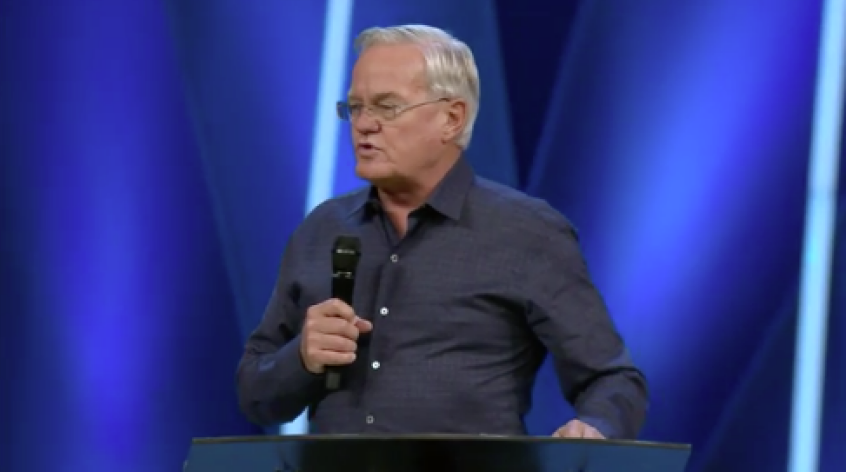The news that influential megachurch pastor Bill Hybels is facing accusations of impropriety towards women will be upsetting to many.
There will be tens of thousands, who, like me, have benefitted from his global leadership summits over the years. To lots of us, he has been an influential role model, not only in what he has taught but in his gracious manner.

There will be plenty of us now worrying and wondering about the truth of the allegations. And for those looking at the Christian faith from the outside, the whole scenario will seem wearily familiar, and reinforces the notion that Christians are simply hypocritical. I am writing this in a Church of England diocese which has been hit by all sorts of child protection controversies. I know well the impact public scandals can have. Hybels, of course, has denied all the allegations, and in the US, as here in the UK, someone is innocent until proven guilty. It is vital to remember that; none of us can fully know what happened. But whatever the truth of these particular accusations, what should we think when we hear the familiar refrain that 'all Christians are hypocrites'?
1. All Christians are hypocrites. Does that surprise you? It should not. The Oxford English Dictionary defines a hypocrite as someone who assumes 'a false appearance of virtue or goodness, with dissimulation of real character or inclinations, especially in respect of religious life or beliefs'. Christians are, by definition, people who recognise that we fall short of the standards we accept as being right and good and true. In one of our Anglican prayers of confession, we admit that 'we have sinned through ignorance, through weakness' and also – crucially – 'through our own deliberate fault'. To be a Christian is to acknowledge that there is a gap between what we think we should be – and, sadly, what we often intentionally choose.
2. Most human beings are hypocrites. This also might seem surprising. But, if we are honest, almost everyone we know well turns out to be someone who sometimes chooses deliberately to act in a way that contradicts what they say they believe. I suppose there may be some instances where people are not hypocritical in the sense that they set themselves no moral aspirations whatsoever, and therefore have nothing to live up to, but in practice, most people do.
3. What we do with our hypocrisy is vital. This is the key thing. If we are Christians, we are to be honest with God, and repent. This is more than a quick 'sorry' to the Lord. Repentance means active change. On her Wartburg Watch website, Dee Parsons cites approvingly the case of an American pastor she knows who 'had an affair, confessed it, stepped down from the pulpit and has led a life of repentance for many, many years. He is an honest hypocrite. In fact, it was he who once said "We are all hypocrites."' I am aware of similar cases in the UK. The alternative is to deny the ways we fall short, and to carry on with what Parsons calls 'dishonest hypocrisy'.
4. Jesus has strong words about hypocrisy. He warns: 'Why do you look at the speck of sawdust in your brother or sister's eye and pay no attention to the plank in your own eye? How can you say to your them, "Let me take the speck out of your eye," when all the time there is a plank in your own eye? You hypocrite, first take the plank out of your own eye, and then you will see clearly to remove the speck from their eye' (Matthew 7: 3-5). We should notice that he is speaking specifically to his own disciples at this point (5:1). He knows what we are like.
5. The hypocrisy of Christians does not invalidate the Christian faith as a whole. As Josh McDowell and Don Stewart have written: 'Christianity stands or falls on the person of Jesus, and Jesus was not a hypocrite. He lived consistently with what he taught.' Mercifully, the Christian faith comes back to Christ, on whom it all depends.
Part of a prayer entitled 'Paradoxes' in the devotional work The Valley of Vision is deeply sobering. And it brings a challenge for all of us who call ourselves Christians: 'Of all hypocrites,' it reads, 'grant that I may not be an evangelical hypocrite, who sins more safely because grace abounds, who tells their lusts that Christ's blood cleanses them, who reasons that God cannot cast them into hell, for they are saved, who loves evangelical preaching, churches, Christians, but lives unholily... Give me a broken heart that yet carries home the water of grace.' May that be true for us all.
David Baker is a former daily newspaper journalist now working as an Anglican minister in Sussex, England. Find him on Twitter @Baker_David_A.
The Rough Guide to Discipleship is a fortnightly series.













